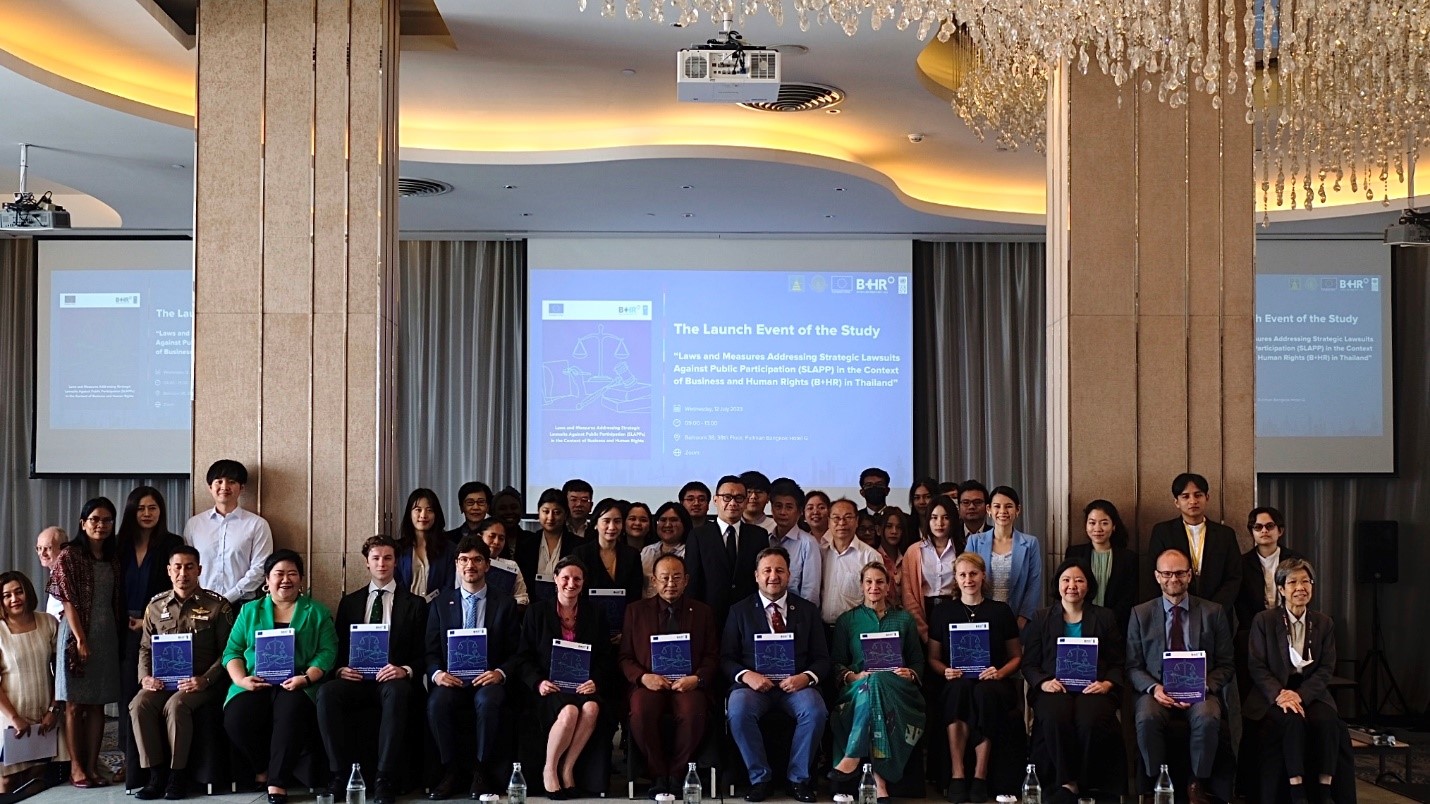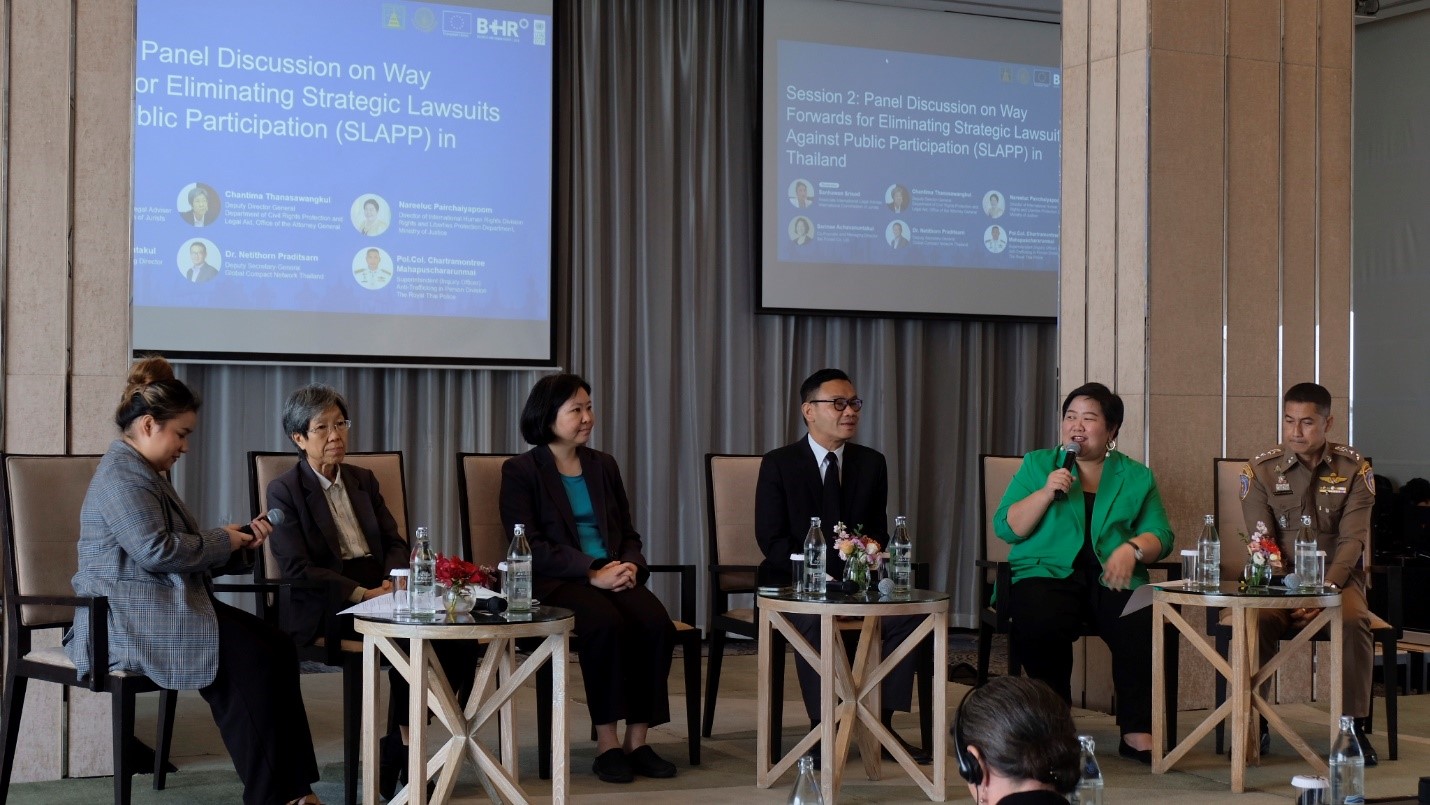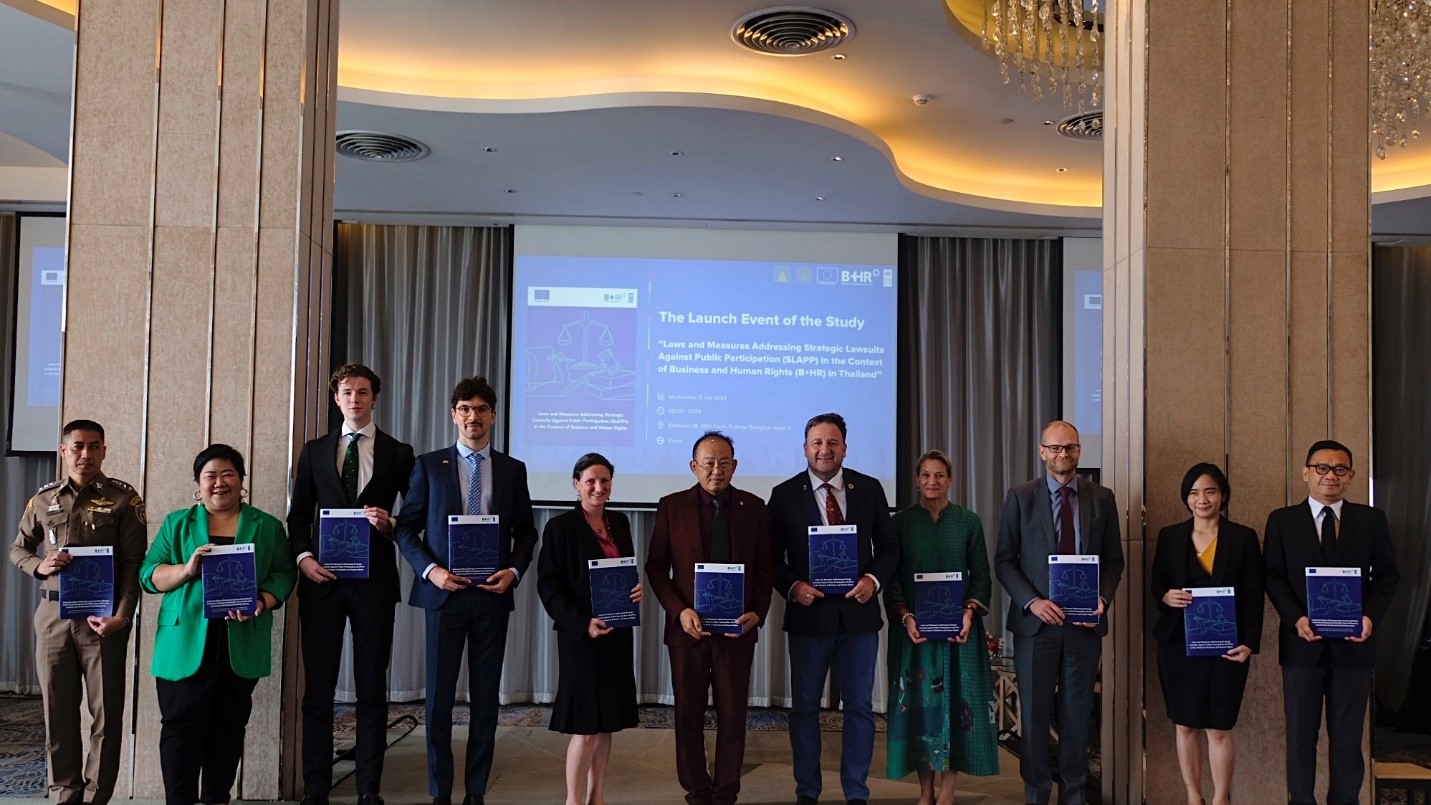
12 กรกฎาคม 2566 – ดร. เนติธร ประดิษฐ์สาร ผู้ช่วยบริหาร ประธานคณะผู้บริหาร รองกรรมการผู้จัดการอาวุโส สำนักความร่วมมือระหว่างประเทศด้านความยั่งยืนและสื่อสารองค์กร เครือเจริญโภคภัณฑ์ และ รองเลขาธิการ และกรรมการบริหารสมาคมเครือข่ายโกลบอลคอมแพ็กแห่งประเทศไทย (GCNT) ได้เข้าร่วมการประชุมเพื่อเปิดตัวรายงานการศึกษาเรื่อง “กฎหมายและมาตรการป้องกันการดำเนินคดีเชิงยุทธศาสตร์ เพื่อระงับการมีส่วนร่วมของสาธารณะในบริบทธุรกิจกับสิทธิมนุษยชน ในบริบทธุรกิจกับสิทธิมนุษยชนในประเทศไทย” โดยโครงการพัฒนาแห่งสหประชาชาติ ประจำประเทศไทย (UNDP) และ กระทรวงยุติธรรม เป็นเจ้าภาพ โดยมีตัวแทนจากภาคส่วนต่าง ๆ ในประเทศไทย ผู้เชี่ยวชาญด้านสิทธิมนุษยชน นักปกป้องสิทธิมนุษยชน สถานทูตและอื่น ๆ เข้าร่วมเพื่อหารือเกี่ยวกับปัญหาการดำเนินคดีเชิงยุทธศาสตร์ เพื่อระงับการมีส่วนร่วมของสาธารณะ (SLAPP) ในภาคธุรกิจ รายงานที่เผยแพร่โดย UNDP ครอบคลุมการใช้ SLAPP ในภาคธุรกิจตลอดหลายทศวรรษ และรวมถึงคำแนะนำสำหรับการดำเนินการสำหรับผู้มีส่วนได้ส่วนเสีย เช่น หน่วยงานรัฐบาล กระบวนการยุติธรรม ภาคประชาสังคม และภาคธุรกิจ
ดร. เนติธร ประดิษฐ์สาร ได้ร่วมเสวนากับวิทยากรจากทั้งภาครัฐและเอกชน ให้มุมมองภาคเอกชน และย้ำถึงความมุ่งมั่นของ GCNT ในการยับยั้งการใช้ SLAPP ในทุกภาคส่วน โดยเฉพาะในภาคธุรกิจ และเมื่อปี 2564 GCNT ได้ประกาศคัดค้านการใช้ SLAPP และเรียกร้องให้สมาชิก GCNT ไม่ใช้ SLAPP ตลอดจนตระหนักถึงความสำคัญของการมีส่วนร่วมของประชาชนและความโปร่งใสในการดำเนินธุรกิจ ดร.เนติธรให้ความสำคัญกับการแก้ปัญหาที่ต้นตอของ SLAPP ในภาคธุรกิจ ซึ่งคือการละเมิดสิทธิมนุษยชน ด้วยการสร้างกระบวนการการตรวจสอบสิทธิมนุษยชนรอบด้าน (HRDD) ที่เข้มแข็งและโปร่งใส ซึ่งให้ช่องทางมีส่วนร่วมของผู้มีส่วนได้ส่วนเสีย และการรายงานเรื่องร้องทุกข์ การละเมิดใด ๆ จะได้รับการจัดการผ่านกระบวนการที่ยุติธรรม เป็นกลาง และมีส่วนร่วม การขยายพื้นที่พูดคุยและแบ่งปันเรื่องราวร้องทุกข์ ช่วยให้ผู้ได้รับผลกระทบมีทางเลือกในการเยียวยา เพื่อป้องกันไม่ให้ความขัดแย้งปะทุขึ้นและส่งผลกระทบในทางลบต่อทั้งสองฝ่าย กระบวนการของ HRDD สามารถเป็นประโยชน์สำหรับภาคธุรกิจและภาคประชาสังคมได้เหมือนกัน
C.P. Group Joins UNDP and the Ministry of Justice in Reaffirming the Importance of Anti-SLAPP Measures
12th July 2023 – Dr. Netithorn Praditsarn, Executive Assistant to Group CEO and Senior Vice President of the Global Partnership for Sustainability and Communications of Charoen Pokphand Group, and Deputy Secretary-General of the Global Compact Network Thailand (GCNT), took part in the launch event for the United Nations Development Program’s (UNDP) study on “Law and Measures Addressing Strategic Lawsuit Against Public Participation (SLAPP) in the Context of Business and Human Rights.” The event, which was hosted by the UNDP and the Ministry of Justice, was attended by representatives from various sectors in Thailand that included experts in human rights, human rights defenders, embassies, and more, to discuss the problematic use of and solutions to SLAPPs in the business sector. The report published by the UNDP covers the usage of SLAPPs across the business sector over several decades and includes recommendations of actions for stakeholders such as policymakers, government agencies, the justice system, civil society, and businesses.
Dr. Netithorn took part in the panel with speakers from both the public and private sector, providing the private sector’s perspective on the issue of SLAPPs. Dr. Netithorn reaffirmed the GCNT’s dedication to preventing the usage of SLAPPs; in 2021, GCNT announced its objection to the use of SLAPPs and has since called on its members to avoid using them, as well as to recognize the importance of public participation and transparency in business operations. Dr. Netithorn also emphasized the importance of solving the root cause of SLAPPs in the business sector, which are the violation of human rights. By establishing robust and transparent human rights due diligence (HRDD) processes that provides effective channels for stakeholder engagement and grievance reporting, any violations that were not already prevented would be managed through fair, impartial, and participatory non-judicial processes. By expanding the space for discussion and the sharing of grievances, affected parties are provided with an alternative channel for remedy. In preventing the conflict from flaring up and affecting both parties negatively, a HRDD process can be beneficial for businesses and civil society alike.



